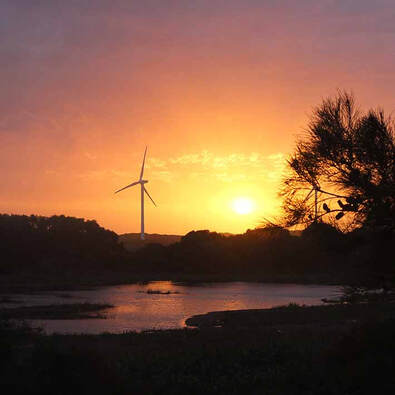 Wonthaggi wind farm
Wonthaggi wind farm By Michael Whelan
THIS week Bass Coast Council committed to buying all its electricity from renewable sources in Victoria.
We are teaming with several metropolitan councils to source 100 per cent of our electricity from renewable sources through the Local Government Power Purchase Agreement, a project led by the City of Darebin.
By working with the large metropolitan councils, Bass Coast gains access to strong expertise and will achieve significant purchasing power and better pricing. Power purchasing agreements are a powerful tool in encouraging renewable energy projects and this agreement may well underpin new projects in Victoria.
THIS week Bass Coast Council committed to buying all its electricity from renewable sources in Victoria.
We are teaming with several metropolitan councils to source 100 per cent of our electricity from renewable sources through the Local Government Power Purchase Agreement, a project led by the City of Darebin.
By working with the large metropolitan councils, Bass Coast gains access to strong expertise and will achieve significant purchasing power and better pricing. Power purchasing agreements are a powerful tool in encouraging renewable energy projects and this agreement may well underpin new projects in Victoria.
This is another step toward net zero emissions for Bass Coast and sits well with other low emission projects by Council that include significant solar projects and work to plan for the uptake of electric vehicles in the region.
The renewable electricity project further demonstrates significant leadership from local government in addressing Victoria’s carbon emissions.
Last year Bass Coast declared a climate emergency and committed to zero net emissions by 2030. Since then we have set about a thorough process to plan for the council to achieve net zero emissions and to work with the community to achieve community-wide net zero emissions by 2030.
Importantly, the Local Government Power Purchase Agreement is flexible, allowing for Bass Coast to withdraw demand and commit to a local purchasing agreement to support local community energy projects in the future. Such projects may form a significant part of the climate emergency plan currently being worked on by the council.
Community energy projects could play a significant role in reducing emissions while giving communities price certainty and protection from the price spirals driven by the major retailers and the gold plating that has occurred on the grid.
Local projects support local investment and lead to local green jobs. The Energy Innovation Co-operative recently completed a renewable energy project involving solar panels and battery storage at the State Coal Mine historical precinct. This project employed local contractors and provides income for other community projects.
The rate of take up of rooftop solar has been excellent and rewarding for those who can afford it. However, many people in the community – renters and those struggling to make ends meet – are left behind. Community energy projects are a way of supporting the whole community to benefit.
The council will soon consider the shire’s Climate Emergency Plan. It will provide a comprehensive roadmap for achieving net zero emissions by 2030 and plan for addressing the impacts of climate change already being felt across the Shire. It is pleasing to see our council is already on the way to achieving 100 per cent renewable energy.
Cr Michael Whelan is Bass Coast Council’s representative on the South East Council’s Climate Change Alliance, the Western Port Biosphere Reserve and the Regional Renewable Energy Roadmap.
The renewable electricity project further demonstrates significant leadership from local government in addressing Victoria’s carbon emissions.
Last year Bass Coast declared a climate emergency and committed to zero net emissions by 2030. Since then we have set about a thorough process to plan for the council to achieve net zero emissions and to work with the community to achieve community-wide net zero emissions by 2030.
Importantly, the Local Government Power Purchase Agreement is flexible, allowing for Bass Coast to withdraw demand and commit to a local purchasing agreement to support local community energy projects in the future. Such projects may form a significant part of the climate emergency plan currently being worked on by the council.
Community energy projects could play a significant role in reducing emissions while giving communities price certainty and protection from the price spirals driven by the major retailers and the gold plating that has occurred on the grid.
Local projects support local investment and lead to local green jobs. The Energy Innovation Co-operative recently completed a renewable energy project involving solar panels and battery storage at the State Coal Mine historical precinct. This project employed local contractors and provides income for other community projects.
The rate of take up of rooftop solar has been excellent and rewarding for those who can afford it. However, many people in the community – renters and those struggling to make ends meet – are left behind. Community energy projects are a way of supporting the whole community to benefit.
The council will soon consider the shire’s Climate Emergency Plan. It will provide a comprehensive roadmap for achieving net zero emissions by 2030 and plan for addressing the impacts of climate change already being felt across the Shire. It is pleasing to see our council is already on the way to achieving 100 per cent renewable energy.
Cr Michael Whelan is Bass Coast Council’s representative on the South East Council’s Climate Change Alliance, the Western Port Biosphere Reserve and the Regional Renewable Energy Roadmap.